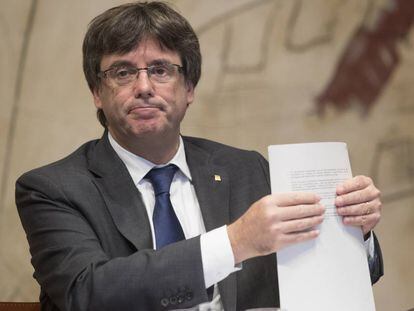The dialogue that we need on the Catalan independence challenge
Once the rule of law has been restored in the region, a negotiating framework needs to be established

The secessionist challenge in Catalonia has created a hugely difficult situation, triggering dramatic moments such as the arrest this week of 14 people, including top officials on suspicion of involvement in preparing the illegal independence vote; raids against dozens of regional government offices; and street demonstrations encouraged by the Generalitat (as the regional government is known) and pro-sovereignty associations. All of this will mean that extensive police and judicial action is needed in Catalonia in the coming days, weeks and months.
Extensive police and judicial action is needed in Catalonia in the coming days, weeks and months
Proof of this is the fact that the Constitutional Court on Thursday decided to impose heavy fines on members of the Sindicatura, the electoral commission that is organizing the referendum, even as the investigating judge at Barcelona’s 13th Examining Court and the Civil Guard proceeded with the operation they launched on Wednesday, and the Catalan government publicized the existence of a website indicating where citizens should go to vote.
The chain of judicial, police and government action is thus continuing its course as October 1 approaches, and it could be no other way in a democracy based on the rule of law. But the progress that’s being made to restore legality and respect for the Constitution – as uncomfortable as it is for everyone, yet necessary and urgent in the face of this coup against national sovereignty – cannot replace, when the right time comes, political courage and democratic dialogue.
And let us underscore the part about “the right time.” In politics, dialogue is obviously a need and an obligation at the same time. But generic appeals to dialogue without first setting goals and boundaries are not just useless when it comes to solving problems, they may in fact generate erroneous expectations that will make the problem even more intractable. Catalan premier Carles Puigdemont, for instance, keeps pointing at his own openness to dialogue, yet he contradicts himself in the next sentence when he asserts that the only possible outcome of dialogue must be a referendum on secession from Spain.
In other circles, the concept of dialogue is all too often used as an easy recourse to conceal one’s own weakness and lack of ideas. Such a dialogue – whether viewed as a trap or a cliché phrase – can only serve to fool the public, create frustration and prolong the conflict.
The progress being made to restore legality and respect for the Constitution cannot replace political courage and democratic dialogue
For dialogue to begin and be fruitful, rather than turn into an empty mantra to be used when there is nothing more to say, a few conditions must be met. First, dialogue will only provide a framework to resolve the serious disagreement now pitting a good section of Catalan society against the rest of Spain, once there is general acceptance that a democracy based on the rule of law has the legitimacy to restore the legality that was damaged in Catalonia on September 6 and 7. Only after there is a clear return to this respect for the law, can we begin a mature, serene, constructive dialogue that accepts the mission to take this country forward to a new framework of stability.
Secondly, the only realistic kind of dialogue will be one that is structured along institutional, transparent lines; one that gives itself a broad time-frame – necessary, given the scope of the challenge – yet within reasonable limits; and one that seeks some minimum common ground that includes pacification, loyalty to legality, and of course a satisfactory way to make Catalonia fit inside a reformed Spain.
Thirdly, if the political conflict has become a social one, with thousands of demonstrators out on the streets trying to halt the justice system’s actions and entire layers of the Catalan population mobilizing against being a part of Spain, then there is an obvious need to win them over and to incorporate the largest possible sectors of society into a common transformation project. It is certain that laws must be obeyed, and equally certain that constitutions and criminal codes cannot shape a country into a fixed photograph. Existing tools must be used for a reform that requires a fundamental loyalty to peaceful coexistence under the aegis of legality.
There is an obvious need to incorporate the largest possible sectors of society into a common transformation project
The dialogue that we are talking about will, in short, require time, a minimum set of clear and shared goals, a commitment to the common good by all regional leaders, and the broadness of vision to address changes ranging from constitutional reform to the regional financing system, as Economy Minister Luis de Guindos suggested in an interview on Thursday. Surely, a true dialogue to reform our structures will also require new conversation partners: it is hard to imagine that those who have openly violated the law, or that those who have in the past blocked any chance at change, could now lead such a process.
This dialogue cannot take place yet, nor can it begin until the rule of law is unequivocally restored in Catalonia. What can begin, however, is the political initiative to create a foundation for such dialogue. It is important to say it. It is even more important to do it. The country needs it.
English version by Susana Urra.












































